
|
With Spain's overall debt load approaching 100% of GDP this year, Prime Minister Mariano Rajoy needed to act. And that he did. In May the bearded Spaniard pledged to cut taxes in an attempt to stimulate the national economy. "The general idea is that taxes have to come down," he says. "The goal is to leave more disposable income in the hands of families, improve the competitiveness of the economy, raise savings and above all else to boost employment."
The Rajoy-led government then presented a tax reform package on June 20 which practitioners have described as "seeking to overhaul the main taxes in Spain". In line with Rajoy's earlier comments, the three core aims of the reform effort are outlined as: boost job creation by lowering taxes; improving the competitiveness of companies by giving them incentives to increase their own resources; and improving tax fairness.
A report commissioned by Rajoy, which ultimately led to the reform package, concluded "the tax base is too narrow and over-reliant on labour taxes, which are among the most detrimental to activity".
The reform plans were endorsed by the Spanish Congress on November 20 and the legislation will enter into force from January 1 2015.
Under the plans, the country's corporate tax rate will drop from 30% to 28% next year, with a further reduction to 25% in 2016, while a reduced rate of 15% will apply for a period of two years for companies formed in 2013 or 2014.
The package will also unify the treatment of dividends and gains on holdings in Spanish resident and non-resident entities, by generalising the exemption regime, and alter the requirements to apply the participation exemption, which will lead to a review of Spanish investment structures in foreign entities.
While there will be a removal of certain tax credits as a way of broadening the tax base, the research and development credit will be improved.
The OECD praised the Rajoy government for continuing to prioritise updating the Spanish tax code.
"The courageous reforms enacted over the past two years are paying off," according to OECD Secretary-General Angel Gurria. "It is now crucial to build on these accomplishments with new efforts to enhance growth, boost productivity, further improve competitiveness and get people back to work."
However, while the OECD also praises the incentivisation of R&D spending, it notes that "the credit, while apparently generous, is not widely used" and recommends Spanish authorities speed up the process of certification for tax credit eligibility.
Specifically on the indirect tax front, the Rajoy government in November announced it will introduce a new real-time VAT reporting system from January 1 2017.
Taxpayers have largely reacted positively to the package.
"I understand this [corporate tax cut to 25%] is sufficient to improve the business tax environment and attract investment," says Maribel Mendez, Spanish group tax manager at BMW. "Good news is that the use of loss carry-forwards will be limited to 60% of the taxable income rather than the current temporary limit of 25% and financial goodwill amortisation will be back to 5% in 2016."
The Global Tax 50 2014 |
||
|---|---|---|
| Gold tier (ranked in order of influence) 1. Jean-Claude Juncker 2. Pascal Saint-Amans 3. Donato Raponi 4. ICIJ 5. Jacob Lew 6. George Osborne 7. Jun Wang 8. Inverting pharmaceuticals 9. Rished Bade 10. Will Morris Silver tier (in alphabetic order) Joaquín Almunia • Apple • Justice Patrick Boyle • CTPA • Joe Hockey • IMF • Arun Jaitley • Marius Kohl • Tizhong Liao • Kosie Louw • Pierre Moscovici • Michael Noonan • Wolfgang Schäuble • Algirdas Šemeta • Robert Stack Bronze tier (in alphabetic order) Shinzo Abe • Alberto Arenas • Piet Battiau • Monica Bhatia • Bitcoin • Bono • Warren Buffett • ECJ Translators • Eurodad • Hungarian protestors • Indian Special Investigation Team (SIT) • Chris Jordan • Armando Lara Yaffar • McKesson • Patrick Odier • OECD printing facilities • Pier Carlo Padoan • Mariano Rajoy • Najib Razak • Alex Salmond • Skandia • Tax Justice Network • Edward Troup • Margrethe Vestager • Heinz Zourek |
||









